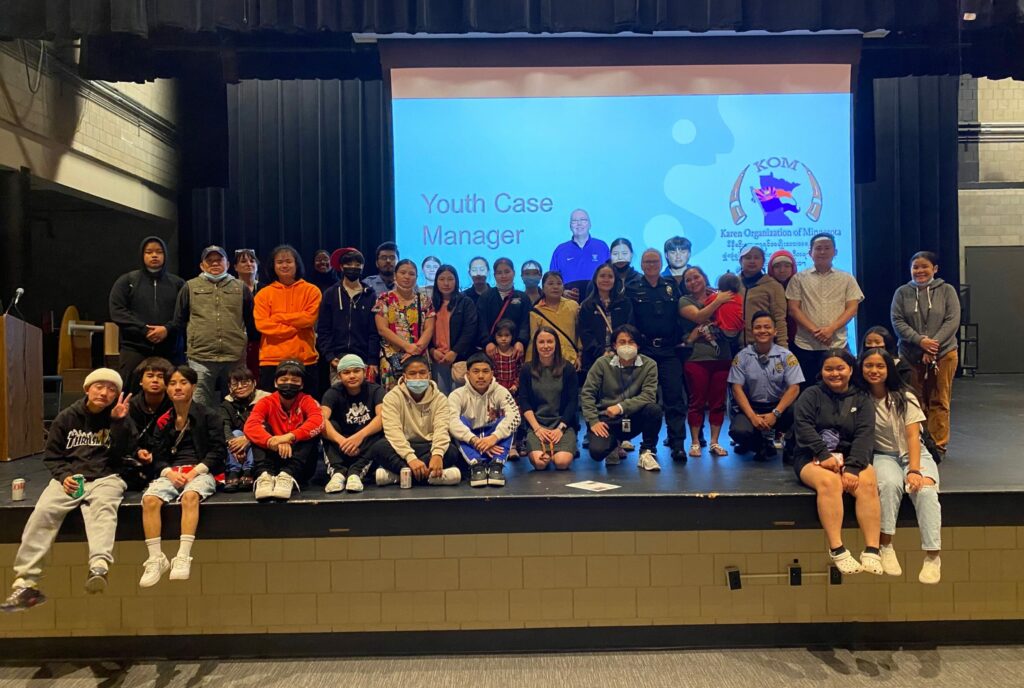
Drug usage continues to rise among the Karen youth as the community is working to help youth face addiction.
The KOM (Karen Organization of Minnesota) Youth Chemical Dependency Program here helps Karen youth who are facing addiction and alcohol problems. KOM supplies prevention education, referrals, and case management. While also referring youth to healthcare providers and treatment centers.
Importance to the Community
The Youth Chemical Dependency Program began at KOM towards the end of 2019. However, the desire for this kind of program from community leaders, parents, and families was a long-time coming. Many in the Karen community were concerned about youth who were using and getting involved in other risky activities. Some Karen leaders shared they were afraid of “losing a generation”.
What is the cause?
When we look at the common risk factors that may lead Karen youth to addiction, the solutions become more complex. Some young people may feel stress from school, bullying, or discrimination and turn to substances or gangs for escape or a sense of belonging. Sometimes it comes from stress from family obligations, conflict, or lack of support. There are also gaps in the system that make it hard for youth and their families to access services.
What do our case managers do?
Connection and support and some of the biggest ways that we’ve seen youth begin their recovery journey. This includes connecting with positive peers and activities, improving family relationships, and becoming more involved in school or religious groups. In addition to connection, support from case managers in navigating the system and accessing services is vital. With language and cultural barriers across the continuum of care, our case managers can be a guide for families.
One of our youth case managers explained,
“Before someone even comes in for an intake, there are so many things that I help them with, like applying for health insurance and other public assistance, helping them find transportation, talking to their probation officer, etc. I provide a lot of education about what is treatment, why do you have to go, and what is the benefit for them. Once they are in treatment, we have to help them with other things they need, like housing, going to court, finding a lawyer, and helping them understand the laws in the U.S. so they don’t break it again. They need help with all of these things because every single American system has access barriers for people who don’t understand the language and culture. If we don’t help them overcome these barriers, no one else will, and they will not be able to focus on their recovery.”
Education, prevention, and peer support
Another important piece is making information accessible to youth before they start using, and spreading that in the community. Within this youth program, there are health educators, who lead the drug use prevention and education program, sharing information with schools, youth groups, churches, and Buddhist communities. This program targets all ages, not just youth, emphasizing the dangers of addiction. Since the program began, around 200-400 youth have participated in prevention education, which includes the individual cases of youth struggling with addiction.
Parents highly value the program as it helps them understand drug risks and prevention strategies. Churches and other religious groups in the community frequently invite the educator to speak about drug misuse prevention.
Youth, parents, and families can also come together in a safe space to talk about what they’re going through at our monthly peer support group. Each month, our staff share resources and lead discussions around topics of interest to the members.
Impact
Given the rising drug usage among Karen Youth, the aim is to aid the Karen community, particularly the youth, in overcoming drug use and achieving positive transformations. We understand that recovery is a long-term process. However, our staff are encouraged by seeing some youth staying sober for months after treatment and returning to school or work.
Although our case managers, who are in the midst of supporting dozens of cases, may not see their direct impact, the fact that parents and youth reach out to them for help is a huge step. It is daunting to not know where to turn in time of need, and our youth case managers alleviate some of that worry by being a safe contact. They understand their clients’ culture and language, and by removing that barrier, they open up a bridge.
If you would like to donate to support the Youth Chemical Dependency Program, please visit our donation page for information to give online or by mail. For questions about donating, please contact Michelle Vohs at 651-202-3121 or mvohs@mnkaren.org.


 (651)788-7593
(651)788-7593


